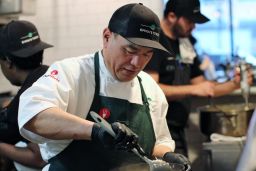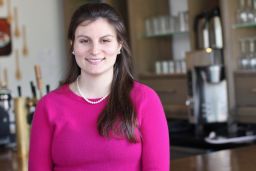Editor’s Note: Know someone who inspires you? Click here to nominate them as a CNN Hero.
Growing up near Washington, D.C. as a child of immigrants, Kerry Brodie knew her parents worked hard to build a better life for their family.
“They came here with opportunities,” Brodie said, “but they’ve always felt such a sense of gratitude to the United States.”
At the same time, Brodie heard stories about the persecution her great-grandparents endured during the Holocaust, their family members who were killed and their ultimate survival.
Inspired by her family’s story, Brodie says she always felt a sense of responsibility to help people build new lives and access the American Dream.
Today, the 28-year-old is using cooking to do just that.

Brodie is the founder of Emma’s Torch, a nonprofit that provides culinary training for refugees and connects them with jobs in restaurant kitchens.
Until recently, the U.S. has historically resettled more refugees than any other country – about 3 million since 1980.
Yet in their new communities, refugees often encounter a slew of obstacles, including language barriers and difficulty accessing services. Even if they have an advanced education or high-level skills, most are only able to obtain entry-level jobs.
“Oftentimes, they’re just falling through the cracks,” Brodie said. “Being a young adult at a time where we’re seeing one of the worst refugee crises in modern history has given me a sense of this is our time to really make a difference.”
Brodie started the nonprofit in 2017 after moving to New York and attending culinary school. She named her organization for the author Emma Lazarus, whose poem is inscribed at the base of the Statue of Liberty.
“We have students who have fled political unrest, … students who are the only survivors of their families,” said Brodie, whose nonprofit also helps asylum seekers and survivors of human trafficking.
The group operates a restaurant in Brooklyn and café at the Brooklyn Public Library’s main branch, where students hone their skills during the 12-week, paid program.
“I really wanted to make sure students were getting real on-the-job training,” Brodie said.
Students spend the first month learning basic food preparation techniques and food safety guidelines. After that, they work at different stations of the restaurant, learning cooking methods such as braising, searing and roasting. In the third month, they get barista training and learn how to take orders and interact with customers.
In addition, they receive English classes tailored toward the kitchen and culinary industry and later do mock interviews and receive interview tips from industry professionals.
Nearly 50 students have graduated from the program, qualified for restaurant employment as line cooks.
For Brodie, the goal is to set graduates on a path with upward mobility.
“When our students graduate, we’re helping them find full-time employment that helps them begin their new careers,” she said.
The nonprofit has support from high-end restaurants throughout the city that Brodie says are eager to hire their graduates.
“I hope that every one of my students can go out there and dream just a little bit bigger and believe that they have a right to pursue those dreams,” she said.
CNN’s Laura Klairmont spoke with Brodie about her work. Below is an edited version of their conversation.
CNN: What are some of the obstacles your students face?
Kerry Brodie: We work with a really diverse population. The experience of being a refugee can actually be really isolating because you’re coming in to a new place, and you’re leaving behind a lot of what you already knew. Our students have been through things that I couldn’t possibly understand and are grappling with a lot of challenges. We’re asking people to adjust to a new country, a new culture, and to really sink or swim. We need to make sure that we’re giving people the ability to swim. But there’s often really limited resources for that type of opportunity.
CNN: What inspired you to start a culinary program for refugees?
Brodie: I was working at the Human Rights Campaign, learning more and more about the asylees who were coming to this country and more broadly about the refugee crisis. It was in 2016 when that photo of Alan Kurdi was shown throughout the news. And it was really forcing people to think about the 65 million people who are currently displaced around the world. At the same time, I was volunteering at a homeless shelter and grappling more and more with the ways in which we could be using food to do more than just feed people. It could be a way to empower people.
Food is this great equalizer. It’s something that has very low barriers to entry when it comes to linguistic skills. And it’s an area where upward mobility is possible. In New York City alone, culinary jobs account for a large percent of jobs, but restaurants are struggling to fill their kitchens with highly trained individuals and finding it harder to retain staff. There’s so many openings that are left unfilled because access to trained people who stay in those positions was really limited.

Ultimately, we’re not just about workforce development, we’re about empowerment—making sure our students understand that they’re not victims and that what they create and do has inherent value. We’re really excited to give our students access to jobs, but also the chance to show their identity and to see that it’s welcome here, that it enhances our community. (They’re) people who have different experiences, who have different ideas about flavors and culture, and that can help restaurants feel more and more inspired.
CNN: How does the program help graduates build careers in the industry?
Brodie: Early on in the program, students also discuss their career goals. They are asked where they want to be in five years and begin to work out a career plan. Our whole team is really dedicated to how can we create an environment where our students can grow and thrive. We find ways to work with them as individuals, to recognize that everybody has a different story and that everybody has a different career path and just finding ways to be more sensitive to that. By the time a student graduates, we know what their hopes and dreams are.
We have an amazing council of restaurants and chefs and people in the industry who are really dedicated to helping our students achieve those dreams. It’s a partnership. We provide ongoing mentorship so that when you have a question about work, a question about starting that new business, you know you can turn to us. It’s really about building a network. We are trying to be a constant source of support and understanding. Our students walk out with a real sense of family and community.
Want to get involved? Check out the Emma’s Torch website and see how to help.
To donate to Emma’s Torch via CrowdRise, click here.






